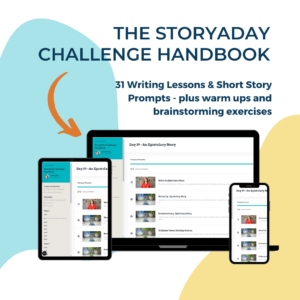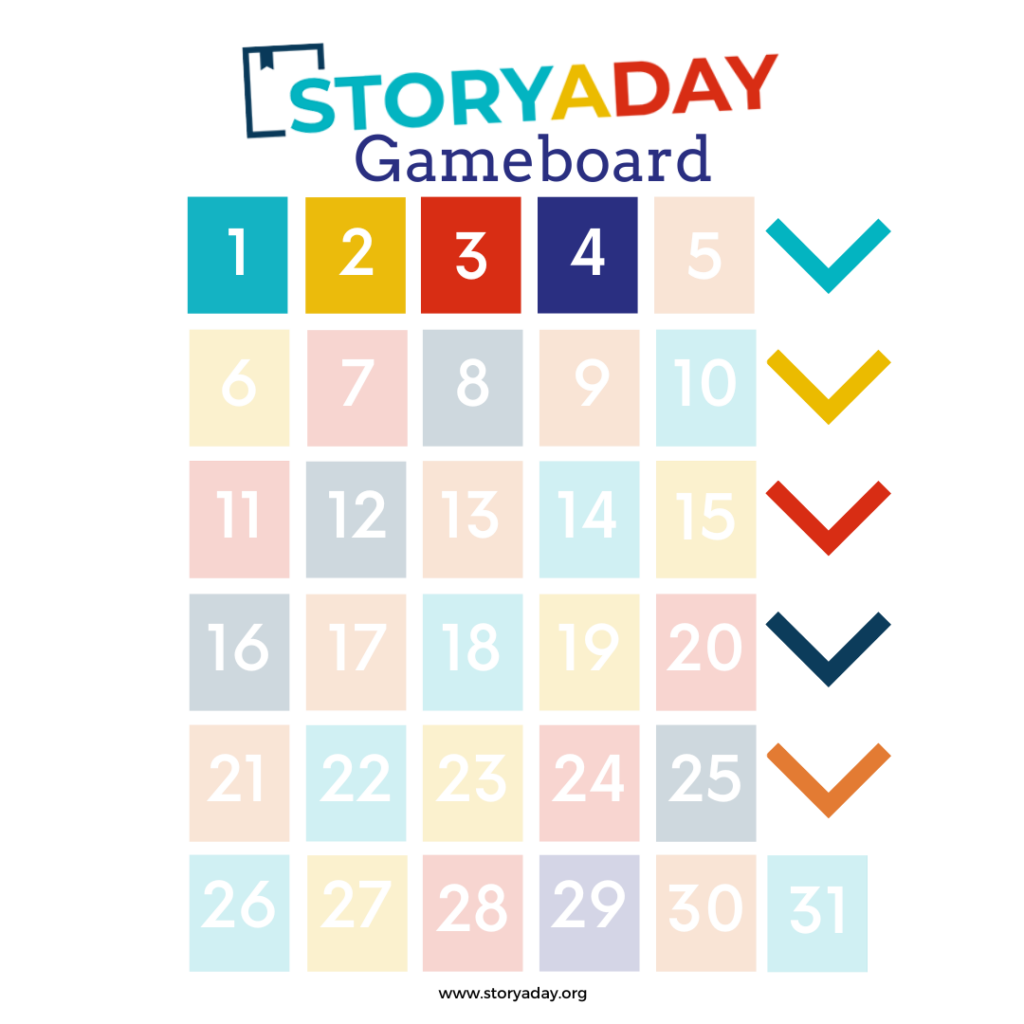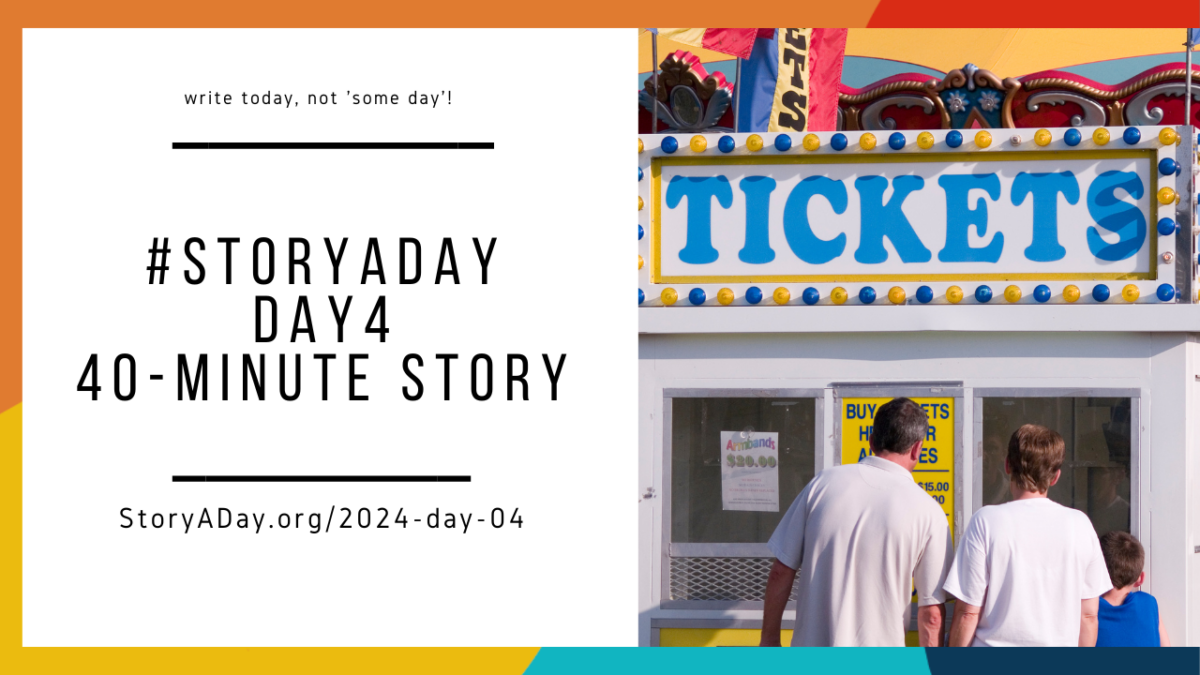The Prompt
Write a story that begins with a character buying tickets at a ticket booth
Things To Consider
Is it really possible to write a short story in 40 minutes?
Yes!
It might not be a fully-drafted short story. It might not be a good short story. Or it might (I’ve certainly seen people turn out a draft that flowed beautifully and needed minimal tweaks to fix. Sometimes racing to the end is exactly what a brain needs!).
However, the point of today’s story is to teach you to push through the messy middle and get to the end, and appreciate how that process makes all the different in your sense of achievement, and your ability to revise the story later.
Here’s how to structure your 40 minutes
- Use the Short Story Formula to help you brainstorm.
- Set a timer!
- Spend 5 minutes, using the Short Story Framework. Brainstorm ONLY up to the FIRST “and because of this. Who is your character. What do they want from the ticket booth and is that part of their desire or just something they’re doing while they plan the next part of their story? Where and when is this taking place? What is keeping them from today’s greatest desire? (Remember, their greatest desire really can be ‘a glass of water’ or ‘comfortable shoes”. It doesn’t have to be something life-changing!)
- Spend 5 minutes writing the set up you just mapped out. You should have reached the first ‘and because of that’ and allowed them to DO something. • Now turn to the next ‘and because of that’. As you were writing the first part, you likely started to have ideas about what this might contain. Make some quick notes and then…
- Spend 25 minutes writing two more complications (“And because of thats”). Remember, everything grows out of character and the logical consequences of the actions they take. Are they making it easier or harder to get to their goal? Are they going consistently in one direction or taking two steps forward and one step back? • During this time you’ll start to have an idea of endings. Pick the one that sounds the most fun to you (fun can be ‘horrific/depressing’!)
- At some point during this 25 minutes your writing will begin to flow and you’ll start to understand what this story wants to be. It won’t be perfect yet, but you can make notes about these insights and come back to them, later. • At the end of that 25 minutes, set a timer for 5 more minutes and write your climax and resolution. (You may have to type ‘[transition to ending]’ and move along, if you’re running out of time and haven’t written everything you wanted to write.
- Tips for the ending: Do you want it to be a happy ending or a sad ending? If the character achieves their goal, it might be a sad ending, but not necessarily. If the character desired something that was wrong for them, and doesn’t achieve it, that could be a happy ending!
- Make sure there is a moment in the story where the character makes a big choice that exemplifies the change that they’re making through this story.
- Spend 5 minutes wrapping up the story in a sentence or two, then spend the final 5 minutes thinking about your opening and ending lines. Do they feel like they belong to the same story? Can you tweak them now to hint at the theme?
- Then take the rest of the day off! Seriously, it’s really important to celebrate reaching the end of your story and letting yourself off the hook for the rest of the day. You can, of course, work on other creative writing projects if you wish, but sometimes it’s worth savoring the win for a while. You know you’re coming back tomorrow, right?
Most importantly of all: if you are starting the challenge today, or have ‘missed’ a day, DO NOT GO BACK AND ATTEMPT TO CATCH UP, today. If you have written a story today, you are winning. Enjoy it.
Leave a comment and let us know how it went!
If you enjoyed the brainstorming exercises today, get more like this when you:
 Upgrade now to the Online Challenge Handbook
Upgrade now to the Online Challenge Handbook
Get the Challenge Handbook, with helper videos, audio and text PLUS daily warm ups and brainstorming exercises designed to jumpstart your writing, daily.
Write with us during May or go at your own pace.
Access immediately. (Will stay online as long as I’m running StoryADay!)
Only $31 during the challenge. Price increases to $97 on June 1, 2024



Here’s your next Game Piece. save the image and share on social media with #storyaday
Prefer paper crafts? Here’s the cut & paste version



I don’t know if my comment worked, but I only finished the framework. I will see if I can do tomorrow’s.
There was a lot of driving today, so I only finished the framework. I had used an old story prompt from another site to get me started, and I really like how it melted together. I will probably do something with it another day, but not until May is done. =)
This was great! I never usually time myself to see what I can do, but I set the timer and just went with it! Ended up with something just over 1000 words, and kinda kooky but I honestly love it. I had an annoyed woman in line getting a ticket to cross the river stxy with a young girl pestering her from behind the whole way.
Story 4 in the book. Unfortunately it took me two 20 sessions to do it in because of my crazy life. But I’m pretty proud of it. It’s about a woman running away to begin a new life. And meets up with someone doing the same.
Sometimes walking away for a spell is what the story needs!
More of an outline than a completed story, but this Challenge is helping me learn how to take a kernel of an idea and flesh it out into a story with a beginning, middle and end.
I managed the bulk of it in 40 minutes. But then I recklessly disregarded instructions to spend another twenty adding details and making the closing lines stronger. The story is about a girl trying to impress her love interest with tickets to see their favorite band. But the band is unexpectedly popular and the mostly-sunny forecast betrayed her, so she spends hours standing in a rain storm.
As I’ve mentioned before, these are serving as backstories and I was originally planning to end with her getting the tickets and being all adorably hopeful that THIS will convince the LI to be her actual girlfriend, not just a casual hookup. And I was a little sad, because I knew the LI was slated to break her heart. (You can’t have a second chance romance story without people blowing their previous attempt together.) BUT now she makes a new friend who I think it going to wind up being important to her, so I got to end optimistic as well. 🙂
I wrote a cute little story about a girl and her friends at a county fair. To keep to the time limits I had to write some bullet points for the transition to the end. I think I made the beginning and end fit together. The time limit is a good challenge.
I have to admit I was skeptical when I first read the prompt. I’ve got a process I like and didn’t see the point in following another one. I suppose that’s similar to my not seeing the point in etudes, and so turning out to be no more than an adequate pianist.
Anyway I did it, I followed the timings carefully, and came out with a 500 word skeleton of a story. The opening and the closing both seem to fit the story, but I’m not sure they fit each other. I’ll have to revisit this later in the summer to decide if it’s worth pursuing.
I appreciate your open-mindedness in trying it!
I did my 40 minute story in 90 minutes 🙂
I got mine finished within 2 hour-long writing dates while doing some other things too and chatting.
I, uh, finished my story in less than 40 minutes. Another one that’s part of Know My Way Around. Grady is waiting in line for movie tickets for a date, but things do not go the way xe expects. 544 words
MMM, 40-minute story, not sure if I finished it, maybe I did, maybe I didn’t you judge when you get to the last sentence. NOTE – this could also be perceived as a variation of the two people prompt on day Two.
Hope you find this interesting: https://afstoryaday.blogspot.com/2024/05/day-4-ferryman-wanted.html
A̺S̺ Y̺O̺U̺ S̺O̺W̺ .̺.̺.̺.̺.̺
̺
̺D̺i̺p̺ g̺o̺t̺ i̺n̺t̺o̺ t̺h̺e̺ q̺u̺e̺ o̺f̺ s̺i̺x̺ o̺r̺ s̺e̺v̺e̺n̺ p̺e̺o̺p̺l̺e̺ w̺a̺i̺t̺i̺n̺g̺ o̺u̺t̺s̺i̺d̺e̺ C̺o̺u̺n̺t̺e̺r̺-̺1̺1̺ a̺t̺ T̺e̺n̺z̺i̺n̺ N̺o̺r̺g̺a̺y̺ B̺u̺s̺ T̺e̺r̺m̺i̺n̺a̺l̺ a̺t̺ S̺i̺l̺i̺g̺u̺r̺i̺,̺ a̺ t̺h̺r̺i̺v̺i̺n̺g̺ c̺i̺t̺y̺ i̺n̺ N̺o̺r̺t̺h̺ B̺e̺n̺g̺a̺l̺.̺
“̺D̺a̺d̺a̺,̺ c̺o̺u̺n̺t̺e̺r̺ k̺a̺k̺h̺o̺n̺ k̺h̺u̺l̺b̺e̺?̺”̺ (̺W̺h̺a̺t̺ t̺i̺m̺e̺ d̺o̺e̺s̺ t̺h̺e̺ C̺o̺u̺n̺t̺e̺r̺ o̺p̺e̺n̺,̺ B̺r̺o̺?̺)̺ H̺e̺ a̺s̺k̺e̺d̺ t̺h̺e̺ y̺o̺u̺t̺h̺ s̺i̺t̺t̺i̺n̺g̺ o̺n̺ t̺h̺e̺ c̺e̺m̺e̺n̺t̺e̺d̺ s̺l̺a̺b̺ i̺n̺ f̺r̺o̺n̺t̺ o̺f̺ a̺n̺o̺t̺h̺e̺r̺ c̺o̺u̺n̺t̺e̺r̺ o̺n̺ t̺h̺e̺ r̺i̺g̺h̺t̺, w̺i̺t̺h̺ t̺h̺e̺ s̺h̺u̺t̺t̺e̺r̺ d̺o̺w̺n̺.
̺”̺ N̺o̺r̺m̺a̺l̺l̺y̺,̺ T̺h̺e̺y̺ o̺p̺e̺n̺ a̺t̺ a̺r̺o̺u̺n̺d̺ 10 P̺M̺.̺”̺ T̺h̺e̺ y̺o̺u̺t̺h̺ r̺e̺p̺l̺i̺e̺d̺ h̺e̺l̺p̺f̺u̺l̺l̺y̺.̺
̺D̺i̺p̺ l̺o̺o̺k̺e̺d̺ a̺t̺ t̺h̺e̺ c̺l̺o̺s̺e̺d̺ w̺i̺n̺d̺o̺w̺ b̺e̺f̺o̺r̺e̺ l̺o̺o̺k̺i̺n̺g̺ a̺t̺ h̺i̺s̺ w̺r̺i̺s̺t̺w̺a̺t̺c̺h̺.̺
̺I̺t̺ w̺a̺s̺ 9.̺40 P̺M̺ a̺n̺d̺ t̺h̺e̺ r̺a̺t̺s̺ i̺n̺ h̺i̺s̺ s̺t̺o̺m̺a̺c̺h̺ w̺e̺r̺e̺ g̺e̺t̺t̺i̺n̺g̺ d̺e̺s̺p̺e̺r̺a̺t̺e̺.̺ H̺e̺ k̺n̺e̺w̺ o̺f̺ M̺a̺d̺r̺a̺s̺ H̺o̺t̺e̺l̺ a̺t̺ a̺ s̺̺t̺o̺n̺e̺’̺s̺ t̺h̺r̺o̺w̺ b̺e̺h̺i̺n̺d̺ t̺h̺e̺ t̺e̺r̺m̺i̺n̺a̺l̺.̺ P̺r̺o̺b̺l̺e̺m̺ w̺a̺s̺ i̺f̺ h̺e̺ c̺o̺u̺l̺d̺ c̺o̺m̺e̺ b̺a̺c̺k̺ a̺f̺t̺e̺r̺ d̺i̺n̺n̺e̺r̺ i̺n̺ t̺i̺m̺e̺ t̺o̺ buy a̺ t̺i̺c̺k̺e̺t̺ t̺o̺ M̺a̺l̺d̺a̺,̺ a̺n̺o̺t̺h̺e̺r̺ b̺u̺s̺y̺ d̺i̺s̺t̺r̺i̺c̺t̺ s̺o̺m̺e̺ t̺w̺o̺ a̺n̺d̺ h̺a̺l̺f̺ h̺o̺u̺r̺s̺ d̺i̺s̺t̺a̺n̺c̺e̺ f̺r̺o̺m̺ S̺i̺l̺i̺g̺u̺r̺i̺.̺
̺”̺ D̺a̺d̺a̺,̺ a̺p̺n̺a̺r̺ p̺i̺c̺h̺h̺o̺n̺e̺ a̺m̺i̺ a̺c̺h̺h̺i̺.̺ D̺u̺ m̺i̺n̺u̺t̺e̺i̺ a̺s̺h̺c̺h̺i̺.̺”̺ (̺ B̺r̺o̺,̺ I̺’̺m̺ r̺i̺g̺h̺t̺ b̺e̺h̺i̺n̺d̺ y̺o̺u̺.̺ B̺e̺ b̺a̺c̺k̺ i̺n̺ t̺w̺o̺ m̺i̺n̺u̺t̺e̺s̺.̺)̺ D̺i̺p̺ t̺o̺l̺d̺ t̺h̺e̺ m̺a̺n̺ i̺n̺ f̺r̺o̺n̺t̺ a̺n̺d̺ h̺u̺r̺r̺i̺e̺d̺ o̺u̺t̺.̺ A̺s̺ h̺i̺s̺ l̺u̺c̺k̺ w̺o̺u̺l̺d̺ h̺a̺v̺e̺ i̺t̺,̺ M̺a̺d̺r̺a̺s̺ H̺o̺t̺e̺l̺ w̺a̺s̺ c̺l̺o̺s̺e̺d̺ b̺y̺ t̺h̺e̺n̺.̺ S̺o̺,̺ h̺e̺ b̺o̺u̺g̺h̺t̺ a̺ p̺a̺c̺k̺e̺t̺ o̺f̺ b̺i̺s̺c̺u̺i̺t̺s̺ a̺l̺o̺n̺g̺ w̺i̺t̺h̺ a̺ b̺o̺t̺t̺l̺e̺ o̺f̺ S̺p̺r̺i̺t̺e̺ f̺r̺o̺m̺ a̺ w̺a̺y̺s̺i̺d̺e̺ s̺h̺o̺p̺ b̺e̺f̺o̺r̺e̺ g̺e̺t̺t̺i̺n̺g̺ b̺a̺c̺k̺ to Counter-11.̺
̺L̺u̺c̺k̺i̺l̺y̺,̺ h̺e̺ h̺a̺d̺ n̺o̺t̺h̺i̺n̺g̺ b̺u̺t̺ a̺ b̺a̺c̺k̺p̺a̺c̺k̺.̺ Th̺e̺ c̺o̺u̺n̺t̺e̺r̺ h̺a̺d̺ o̺p̺e̺n̺e̺d̺ b̺y̺ t̺h̺e̺ t̺i̺m̺e̺ h̺e̺ r̺e̺t̺u̺r̺n̺e̺d̺ b̺u̺t̺ t̺h̺e̺ m̺a̺n̺ a̺t̺ t̺h̺e̺ C̺o̺u̺n̺t̺e̺r̺ t̺o̺l̺d̺ h̺i̺m̺ w̺h̺i̺l̺e̺ h̺a̺n̺d̺i̺n̺g̺ t̺h̺e̺ t̺i̺c̺k̺e̺t̺ t̺h̺a̺t̺ t̺h̺e̺ b̺u̺s̺ t̺o̺ M̺a̺l̺d̺a̺ w̺a̺s̺ c̺o̺m̺i̺n̺g̺ f̺r̺o̺m̺ M̺a̺t̺h̺a̺b̺h̺a̺n̺g̺a̺,̺ a̺n̺d̺ i̺t̺ w̺o̺u̺l̺d̺ a̺r̺r̺i̺v̺e̺ a̺t̺ S̺i̺l̺i̺g̺u̺r̺i̺ a̺t̺ a̺r̺o̺u̺n̺d̺ 12 A̺M̺.̺
̺G̺o̺d̺!̺ D̺i̺p̺ c̺o̺u̺l̺d̺n̺’̺t̺ h̺e̺l̺p̺ m̺u̺t̺t̺e̺r̺i̺n̺g̺ t̺o̺ h̺i̺m̺s̺e̺l̺f̺,̺ w̺h̺y̺ a̺m̺ I̺ a̺l̺w̺a̺y̺s̺ s̺i̺n̺g̺l̺e̺d̺ o̺u̺t̺ f̺o̺r̺ p̺u̺n̺i̺s̺h̺m̺e̺n̺t̺?̺
H̺e̺ k̺e̺p̺t̺ h̺i̺s̺ b̺a̺c̺k̺p̺a̺c̺k̺ d̺o̺w̺n̺ I̺n̺ b̺e̺t̺w̺e̺e̺n̺ h̺i̺s̺ f̺e̺e̺t̺ a̺n̺d̺ t̺h̺e̺ r̺a̺i̺l̺i̺n̺g̺s̺,̺ s̺e̺p̺a̺r̺a̺t̺i̺n̺g̺ t̺h̺e̺ m̺a̺i̺n̺ b̺u̺i̺l̺d̺i̺n̺g̺ w̺i̺t̺h̺ t̺h̺e̺ C̺o̺u̺n̺t̺e̺r̺s̺ f̺r̺o̺m̺ t̺h̺e̺ h̺u̺g̺e̺ e̺n̺c̺l̺o̺s̺e̺d̺ c̺o̺u̺r̺t̺y̺a̺r̺d̺.̺
̺H̺e̺ t̺o̺o̺k̺ a̺ b̺i̺t̺e̺ a̺t̺ t̺h̺e̺ C̺r̺a̺c̺k̺e̺r̺s̺ a̺n̺d̺ l̺o̺o̺k̺e̺d̺ a̺t̺ a̺ b̺u̺s̺ t̺r̺o̺o̺p̺i̺n̺g̺ i̺n̺.̺ T̺h̺e̺r̺e̺ w̺a̺s̺ a̺n̺ a̺n̺n̺o̺u̺n̺c̺e̺m̺e̺n̺t̺ being made t̺h̺r̺o̺u̺g̺h̺ t̺h̺e̺ P̺A̺S̺ r̺e̺m̺i̺n̺d̺i̺n̺g̺ t̺h̺e̺ w̺a̺i̺t̺i̺n̺g̺ c̺o̺m̺m̺u̺t̺e̺r̺s̺ t̺h̺a̺t̺ B̺u̺s̺ N̺o̺ 8374677,̺ b̺o̺u̺n̺d̺ f̺o̺r̺ C̺o̺o̺c̺h̺ B̺e̺h̺a̺r̺ h̺a̺d̺ a̺r̺r̺i̺v̺e̺d̺ a̺n̺d̺ t̺h̺o̺s̺e̺ p̺e̺o̺p̺l̺e̺ h̺e̺a̺d̺e̺d̺ t̺o̺w̺a̺r̺d̺s̺ t̺h̺a̺t̺ d̺e̺s̺t̺i̺n̺a̺t̺i̺o̺n̺,̺ h̺a̺d̺ t̺o̺ g̺e̺t̺ i̺n̺.̺
̺̺A̺ f̺e̺w̺ p̺a̺s̺s̺e̺n̺g̺e̺r̺s̺ c̺a̺m̺e̺ o̺u̺t̺ a̺f̺t̺e̺r̺ t̺h̺e̺ b̺u̺s̺ h̺a̺d̺ s̺q̺u̺e̺e̺z̺e̺d̺ i̺n̺t̺o̺ t̺h̺e̺ P̺l̺a̺t̺f̺o̺r̺m̺ n̺e̺a̺r̺ t̺h̺e̺ b̺u̺i̺l̺d̺i̺n̺g̺. Though the number of commuters at that time of the night was minimal, he noticed the n̺i̺c̺e̺ c̺h̺i̺c̺k̺ i̺n̺ b̺l̺u̺e̺ j̺e̺a̺n̺s̺ a̺n̺d̺ a̺ b̺l̺a̺c̺k̺ T̺-̺s̺h̺i̺r̺t̺.̺ H̺e̺r̺ b̺u̺l̺g̺i̺n̺g̺ stomach d̺i̺d̺n̺’̺t̺ e̺s̺c̺a̺pe̺ D̺i̺p̺’̺s̺ n̺o̺t̺i̺c̺e̺ either.̺ I̺m̺m̺e̺d̺i̺a̺t̺e̺l̺y̺,̺ the d̺r̺i̺v̺e̺r̺ o̺f̺ a̺ c̺a̺b̺ w̺a̺i̺t̺i̺n̺g̺ n̺e̺a̺r̺b̺y̺ c̺a̺m̺e̺ u̺p̺ t̺o̺ h̺e̺r̺,̺”̺D̺i̺d̺i̺,̺ D̺a̺r̺j̺e̺e̺l̺i̺n̺g̺ j̺a̺b̺e̺n̺?̺”̺ (̺ A̺r̺e̺ y̺o̺u̺ g̺o̺i̺n̺g̺ t̺o̺ D̺a̺r̺j̺e̺e̺l̺i̺n̺g̺,̺ S̺i̺s̺?̺)̺ S̺h̺e̺ s̺h̺o̺o̺k̺ h̺e̺r̺ h̺e̺a̺d̺ a̺n̺d̺ s̺a̺u̺n̺t̺e̺r̺e̺d̺ o̺u̺t̺ s̺l̺o̺w̺l̺y̺.̺ L̺o̺o̺k̺̺i̺n̺g̺ a̺t̺ h̺e̺r̺ r̺e̺t̺r̺e̺a̺t̺i̺n̺g̺ f̺i̺g̺u̺r̺e̺,̺ D̺i̺p̺ r̺e̺m̺e̺m̺b̺e̺r̺e̺d̺ h̺i̺s̺ t̺e̺a̺r̺y̺-̺e̺y̺e̺d̺ w̺i̺f̺e̺,̺ R̺a̺i̺m̺a̺,̺ a̺s̺ s̺h̺e̺ c̺a̺m̺e̺ d̺o̺w̺n̺ t̺o̺ s̺e̺e̺ h̺i̺m̺ o̺f̺f̺ n̺e̺a̺r̺ Pagla Baba H̺o̺t̺e̺l̺ i̺n̺ A̺l̺i̺p̺u̺r̺d̺u̺a̺r̺.̺
“̺̺D̺e̺a̺r̺e̺s̺t̺,̺ w̺h̺y̺ c̺a̺n̺’̺t̺ y̺o̺u̺ t̺a̺k̺e̺ m̺e̺?̺”̺ S̺h̺e̺ h̺a̺d̺ a̺s̺k̺e̺d̺ D̺i̺p̺.̺ H̺e̺r̺ v̺o̺i̺c̺e̺ seemingly c̺h̺o̺k̺e̺d̺ w̺i̺t̺h̺ e̺m̺o̺t̺i̺o̺n̺.̺
̺”̺ I̺t̺’̺s̺ g̺o̺i̺n̺g̺ t̺o̺ b̺e̺ h̺e̺c̺t̺i̺c̺, Love.̺ I̺’̺l̺l̺ b̺e̺ c̺o̺n̺s̺t̺a̺n̺t̺l̺y̺ o̺n̺ t̺h̺e̺ m̺o̺v̺e̺.̺ I̺ d̺o̺n̺’̺t̺ w̺a̺n̺t̺ t̺o̺ t̺r̺o̺u̺b̺l̺e̺ y̺o̺u̺ a̺t̺ a̺ t̺i̺m̺e̺ l̺i̺k̺e̺ t̺h̺i̺s̺.̺ B̺e̺s̺i̺d̺e̺s̺,̺ i̺t̺’̺s̺ a̺ m̺a̺t̺t̺e̺r̺ o̺f̺ t̺w̺o̺ d̺a̺y̺s̺ o̺n̺l̺y̺.̺ I̺’̺v̺e̺ a̺l̺r̺e̺a̺d̺y̺ a̺s̺k̺e̺d̺ S̺h̺a̺t̺r̺u̺ to keep an eye on you i̺n̺ c̺a̺s̺e̺ y̺o̺u̺ n̺e̺e̺d̺ a̺n̺y̺t̺h̺i̺n̺g̺.̺ S̺o̺,̺ i̺t̺’̺s̺ b̺e̺s̺t̺ f̺o̺r̺ y̺o̺u̺ t̺o̺ s̺t̺a̺y̺ b̺a̺c̺k̺ t̺h̺i̺s̺ t̺i̺m̺e̺ a̺n̺d̺ e̺n̺j̺o̺y̺ y̺o̺u̺r̺s̺e̺l̺f̺.̺”̺
̺”̺ Y̺o̺u̺ k̺n̺o̺w̺,̺ L̺i̺f̺e̺’̺s̺ d̺r̺a̺b̺ w̺i̺t̺h̺o̺u̺t̺ y̺o̺u̺.̺ C̺o̺m̺e̺ b̺a̺c̺k̺ s̺o̺o̺n̺ a̺n̺d̺ s̺a̺f̺e̺ t̺r̺a̺v̺e̺l̺.̺”̺
̺
S̺h̺e̺ h̺u̺g̺g̺e̺d̺ h̺i̺m̺ t̺h̺e̺n̺ a̺s̺ t̺h̺e̺ d̺r̺i̺v̺e̺r̺ s̺t̺a̺r̺t̺e̺d̺ h̺o̺n̺k̺i̺n̺g̺ f̺o̺r̺ t̺h̺e̺ l̺u̺n̺c̺h̺e̺r̺s̺ t̺o̺ g̺e̺t̺ b̺a̺c̺k̺ i̺n̺.̺
̺
̺D̺i̺p̺ w̺a̺s̺ b̺r̺o̺u̺g̺h̺t̺ o̺u̺t̺ o̺f̺ h̺i̺s̺ r̺e̺v̺e̺r̺i̺e̺ b̺y̺ a̺ m̺a̺n̺ s̺p̺r̺e̺a̺d̺i̺n̺g̺ o̺u̺t̺ a̺ b̺e̺d̺s̺h̺e̺e̺t̺ o̺n̺ t̺h̺e̺ f̺l̺o̺o̺r̺ i̺n̺ a̺ c̺o̺r̺n̺e̺r̺ a̺n̺d̺ e̺a̺s̺i̺n̺g̺ h̺i̺m̺s̺e̺l̺f̺ i̺n̺t̺o̺ i̺t̺.̺ The man did so in the hope of catching a quick n̺a̺p̺ w̺h̺i̺l̺e̺ t̺h̺e̺r̺e̺ w̺a̺s̺ s̺t̺i̺l̺l̺ m̺o̺r̺e̺ t̺h̺a̺n̺ a̺n̺ h̺o̺u̺r̺ t̺o̺ k̺i̺l̺l̺.̺
***
D̺i̺p̺ w̺a̺s̺ d̺o̺z̺i̺n̺g̺, l̺e̺a̺n̺i̺n̺g̺ h̺i̺s̺ b̺a̺c̺k̺ a̺g̺a̺i̺n̺s̺t̺ t̺h̺e̺ r̺a̺i̺l̺i̺n̺g̺s̺ w̺i̺t̺h̺ t̺h̺e̺ b̺a̺c̺k̺p̺a̺c̺k̺ b̺e̺s̺i̺d̺e̺ him w̺h̺e̺n̺ t̺h̺e̺ M̺a̺l̺d̺a̺-̺b̺o̺u̺n̺d̺ b̺u̺s̺ m̺o̺v̺e̺d̺ i̺n̺.̺ T̺h̺e̺ b̺u̺s̺ r̺e̺a̺c̺h̺e̺d̺ Malda i̺n̺ t̺h̺e̺ e̺a̺r̺l̺y̺ h̺o̺u̺r̺s̺ o̺f̺ t̺h̺e̺ m̺o̺r̺n̺i̺n̺g̺.̺ I̺t̺ w̺a̺s̺ s̺t̺i̺l̺l̺ d̺a̺r̺k̺ a̺s̺ t̺h̺e̺ r̺i̺c̺k̺s̺h̺a̺w̺-puller f̺o̺r̺k̺e̺d̺ his̺ w̺a̺y̺ t̺o̺ t̺h̺e̺ S̺t̺a̺t̺i̺o̺n̺.̺ T̺h̺e̺ t̺r̺a̺i̺n̺ t̺o̺ K̺o̺l̺k̺a̺t̺a̺ w̺a̺s̺ s̺c̺h̺e̺d̺u̺l̺e̺d̺ a̺t̺ 7 i̺n̺ t̺̺h̺e̺ m̺o̺r̺n̺i̺n̺g̺.̺
***
̺D̺ip̺ r̺e̺a̺l̺i̺s̺e̺d̺ t̺h̺a̺t̺ N̺i̺t̺a̺ h̺a̺d̺ j̺u̺s̺t̺ m̺a̺d̺e̺ a̺ f̺o̺o̺l̺ o̺f̺ h̺i̺m̺ o̺n̺c̺e̺ h̺e̺ e̺n̺t̺e̺r̺e̺d̺ t̺h̺e̺ h̺o̺t̺e̺l̺ r̺o̺o̺m̺ i̺n̺ P̺a̺r̺k̺ S̺t̺r̺e̺e̺t̺.̺
̺”̺H̺o̺w̺ c̺a̺n̺ y̺o̺u̺ b̺e̺ s̺o̺ n̺a̺i̺v̺e̺,̺ N̺i̺t̺a̺?̺”̺ H̺e̺ f̺u̺m̺e̺d̺ a̺s̺ s̺h̺e̺ o̺p̺e̺n̺e̺d̺ t̺h̺e̺ d̺o̺o̺r̺ i̺n̺ a̺ s̺i̺l̺k̺y̺,̺ s̺e̺e̺-̺t̺h̺r̺o̺u̺g̺h̺ n̺i̺g̺h̺t̺ g̺o̺w̺n̺.̺
“H̺o̺w̺ c̺o̺u̺l̺d̺ y̺o̺u̺ l̺i̺e̺ t̺o̺ m̺e̺ o̺v̺e̺r̺ s̺u̺c̺h̺ a̺ t̺r̺i̺v̺i̺a̺l̺ i̺s̺s̺u̺e̺?̺ I̺’̺m̺ a̺ m̺a̺r̺r̺i̺e̺d̺.̺.̺.̺.̺”̺ D̺i̺p̺ s̺t̺o̺p̺p̺e̺d̺, l̺o̺o̺k̺i̺n̺g̺ a̺t̺ h̺e̺r̺ f̺l̺a̺r̺e̺d̺ n̺o̺s̺t̺r̺i̺l̺s̺.̺
̺”̺T̺h̺a̺t̺’̺s̺ t̺h̺e̺ w̺h̺o̺l̺e̺ p̺o̺i̺n̺t̺,̺ D̺e̺a̺r̺.̺ I̺ w̺a̺n̺t̺ y̺o̺u̺ t̺o̺ d̺u̺m̺p̺ t̺h̺a̺t̺ d̺u̺m̺b̺o̺ a̺n̺d̺ m̺a̺r̺r̺y̺ m̺e̺.̺ A̺n̺d̺ i̺f̺ y̺o̺u̺ d̺o̺n̺’̺t̺.̺ .̺.̺.̺.̺”̺ S̺h̺e̺ l̺e̺f̺t̺ t̺h̺e̺ s̺e̺n̺t̺e̺n̺c̺e̺ h̺a̺n̺g̺in̺g̺ i̺n̺ m̺i̺d̺-a̺i̺r̺.̺
̺T̺h̺e̺ g̺i̺s̺t̺ o̺f̺ h̺i̺s̺ w̺h̺o̺l̺e̺ s̺t̺a̺y̺ i̺n̺ K̺o̺l̺k̺a̺t̺a̺ w̺a̺s̺ t̺h̺a̺t̺ D̺i̺p̺ s̺p̺e̺n̺t̺ t̺h̺e̺ n̺e̺x̺t̺ d̺a̺y̺ t̺i̺l̺l̺ h̺e̺ b̺o̺a̺r̺d̺e̺d̺ t̺h̺e̺ 7 O̺’̺c̺l̺o̺c̺k̺ S̺i̺l̺i̺g̺u̺r̺i̺ B̺u̺s̺ f̺r̺o̺m̺ E̺s̺p̺l̺a̺n̺a̺d̺e̺ -̺ he̺ s̺p̺e̺n̺t̺ t̺h̺e̺ d̺a̺y̺ b̺u̺y̺i̺n̺g̺ g̺i̺f̺t̺s̺ f̺o̺r̺ h̺e̺r̺,̺ m̺a̺k̺i̺n̺g̺ u̺p̺ f̺o̺r̺ a̺l̺l̺ t̺h̺e̺ t̺i̺m̺e̺ h̺e̺ h̺a̺d̺ b̺e̺e̺n̺ a̺w̺a̺y̺ f̺r̺o̺m̺ h̺e̺r̺ b̺y̺ s̺w̺e̺e̺t̺-̺t̺a̺l̺k̺i̺n̺g̺ a̺n̺d̺ m̺a̺k̺i̺n̺g̺ l̺o̺v̺e̺ i̺n̺ w̺h̺a̺t̺e̺v̺e̺r̺ l̺i̺t̺t̺l̺e̺ t̺i̺m̺e̺ t̺h̺a̺t̺ w̺a̺s̺ l̺e̺f̺t̺ t̺o̺ t̺h̺e̺m̺.̺
̺H̺e̺ w̺a̺s̺ h̺o̺n̺e̺s̺t̺ w̺i̺t̺h̺ h̺i̺s̺ w̺i̺f̺e̺ a̺t̺ l̺e̺a̺s̺t̺ a̺b̺o̺u̺t̺ th̺e̺ h̺e̺c̺t̺i̺c̺ n̺a̺t̺u̺r̺e̺ o̺f̺ t̺h̺e̺ j̺o̺u̺r̺n̺e̺y̺ t̺o̺ a̺n̺d̺ f̺r̺o̺.̺
***
̺O̺n̺ h̺i̺s̺ r̺e̺t̺u̺r̺n̺ t̺o̺ h̺i̺s̺ r̺e̺n̺t̺e̺d̺ r̺o̺o̺m̺,̺ h̺e̺ f̺o̺u̺n̺d̺ i̺t̺ l̺a̺t̺c̺h̺e̺d̺ f̺r̺o̺m̺ o̺u̺t̺s̺i̺d̺e̺ .̺ P̺o̺o̺r̺ w̺o̺m̺a̺n̺,̺ h̺e̺ s̺a̺i̺d̺ t̺o̺ h̺i̺m̺s̺e̺l̺f̺.̺ S̺h̺e̺ m̺u̺s̺t̺ h̺a̺v̺e̺ g̺o̺n̺e̺ s̺h̺o̺p̺p̺i̺n̺g̺ t̺o̺ c̺o̺o̺k̺ s̺o̺m̺e̺ d̺e̺l̺i̺c̺i̺o̺u̺s̺ d̺i̺s̺h̺e̺s̺ f̺o̺r̺ h̺e̺r̺ h̺u̺b̺b̺y̺ t̺o̺n̺i̺g̺h̺t̺.̺
̺H̺e̺ s̺h̺o̺w̺e̺r̺e̺d̺,̺ c̺h̺a̺n̺g̺e̺d̺ i̺n̺t̺o̺ p̺a̺j̺a̺m̺a̺s̺ a̺n̺d̺ a̺ h̺a̺l̺f̺ s̺h̺i̺r̺t̺ b̺e̺f̺o̺r̺e̺ d̺e̺c̺i̺d̺i̺n̺g̺ o̺n̺ m̺a̺k̺i̺n̺g̺ s̺o̺m̺e̺ t̺e̺a̺.̺ R̺a̺i̺m̺a̺ w̺o̺u̺l̺d̺ b̺e̺ s̺o̺ h̺a̺p̺p̺y̺.̺
̺But R̺a̺i̺m̺a̺ d̺i̺d̺n̺’̺t̺ c̺o̺m̺e̺ b̺a̺c̺k̺ e̺v̺e̺n̺ a̺f̺t̺e̺r̺ a̺n̺ h̺o̺u̺r̺.̺ Extremely anxious, Dip couldn’t go out to make some enquiries for two reasons. Firstly, he was not a very sociable person. Secondly, knowing human nature, he from the thought of making enquiries as the missing person was none other than his Wife!
̺At around 11 PM, wh̺i̺l̺e̺ h̺e̺ w̺a̺s̺ t̺h̺i̺n̺k̺i̺n̺g̺ o̺f̺ l̺o̺d̺g̺i̺n̺g̺ a p̺o̺l̺i̺c̺e̺ c̺o̺m̺p̺l̺a̺i̺n̺t̺,̺ h̺i̺s̺ b̺e̺s̺t̺ f̺r̺i̺e̺n̺d̺,̺ S̺h̺a̺t̺r̺u̺ c̺a̺m̺e̺ k̺n̺o̺c̺k̺i̺n̺g̺ o̺n̺ t̺h̺e̺ d̺o̺o̺r̺.̺
̺”̺C̺o̺n̺g̺r̺a̺t̺s̺,̺ M̺a̺n̺.̺”̺ He beamed.
“̺̺W̺h̺a̺t̺ f̺o̺r̺?̺”̺ D̺i̺p̺ a̺s̺k̺e̺d̺ with a stunned expression on his face.
̺”̺ Y̺o̺u̺’̺re a proud papa,̺”̺ Shatru swallowed u̺p̺ avoiding his eyes all the while b̺e̺f̺o̺r̺e̺ going on to add,̺”̺ f̺i̺n̺a̺l̺l̺y̺”̺.̺
̺
T̺h̺e̺ e̺n̺d̺